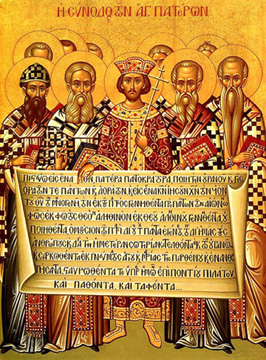First Council of Nicaea

The First Council of Nicaea was a council of bishops who were convened in the Bithynian city of Nicaea by the order of the Roman Emperor Constantine I in AD 325. This council was called ecumenical[1] as the first effort to attain consensus in a group identified as a church through an assembly representing a new form of Christendom.
If we take into consideration Christ's prohibition concerning exercising authority one over the other a serious concern may arise as to the authority of such a council.
These men were assembled by Constantine who convoked men[2] into a council that chose to banish Arian leaders from their churches for heresy. There is no doubt that under the Perfect law of liberty christian laity, ministers, deacons and bishops have the right to state they believe Arian leaders were heretics. Arianism was a doctrine that held that Christ was not divine but was a created being. That certainly may be incorrect for many reasons but did they have a right to banish people because they disagreed with them?
They also established the equality of the Father, the Son, and the Holy Spirit in what they identified as the Holy Trinity and asserted that only the Son became incarnate as Jesus Christ.
There were at least 7 other councils.[3]
- ↑ An ecumenical council, also called general council, is a meeting of bishops and other church authorities to consider and rule on questions of Christian doctrine, administration, discipline, and other matters. "Council | Christianity". Encyclopedia Britannica. Retrieved 12 September 2020.
- ↑ call together or summon (an assembly or meeting)
- ↑ Council of Constantinople in 381, the Council of Ephesus in 431, the Council of Chalcedon in 451, the Second Council of Constantinople in 553, the Third Council of Constantinople from 680–681 and finally, the Second Council of Nicaea in 787.